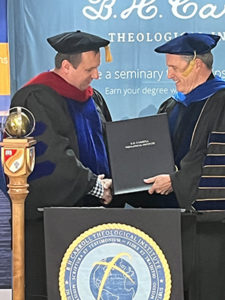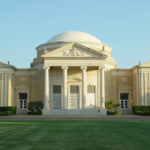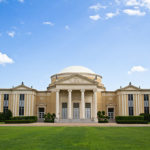Old Testament scholar Slava Gerasimchuk understands more about the Hebrew Exile now than before the Russian invasion of Ukraine forced him and his family from their home.

For more than five months, Gerasimchuk, professor of Old Testament at Odesa Theological Seminary in Ukraine, and his family have lived as refugees in Moldova.
“It’s not home,” Gerasimchuk said of Moldova during a recent trip to the United States. “Even though I was born and grew up there, I’ve lived outside of Moldova more than I have lived in Moldova. For me, Odesa is my home now.”
When the seminary published the summer issue of its journal Bogomyslie (Thinking About God), editors selected “God Among Ruins” as its theme. Writers explored theological responses to the war in Ukraine.
For his part, Gerasimchuk wrote about his article, “The Time of the Silent Harps,” about a Song of Exile, Psalm 137. The psalm describes the mourning of exiles in Babylon, who hung their harps on willows and asked, “How shall we sing the Lord’s song in a strange land?”
He noted the United Nations reports at least 12 million Ukrainians have left their homes, with 5 million living as refugees in other countries and 7 million living as internally displaced people. So, the theme of living in exile has particular resonance for many Ukrainians.
“I think the parallels are more obvious to the refugees who are outside of Ukraine,” he said, noting particularly the issue of family separation for many women and children whose husbands, sons and fathers remain in Ukraine.
Many Ukrainians can relate to the pain and anger of Psalm 137 and other imprecatory psalms, as God’s people cried out to the Lord asking him to punish their enemies, he observed.
‘Feeling of detachment … never leaves you’
In early April, Gerasimchuk’s wife Tetiana participated in an online roundtable discussion, “The Russia-Ukraine War: Women’s Voices,” providing the perspective of a Ukrainian family living as refugees. Unlike her husband, who holds a Moldovan passport, she was born in Odesa and spent most of her life there.
Sign up for our weekly edition and get all our headlines in your inbox on Thursdays
“You are uprooted, and you start to live in a place where you don’t belong,” she said. “No matter how many good, nice and kind people you meet on your way or how comfortable your conditions are at the moment, the feeling of detachment is always there and never leaves you.”
She described living with uncertainty and the inability to make plans for the future, comparing it to “solving an equation with too many unknowns.”
Even though her family seems to be safe in Moldova, “No one can guarantee Moldova is not the next dish on Mr. Putin’s menu,” she said.
At the same time, she expressed a measure of survivor’s guilt, knowing her family lives in relative comfort while others in Ukraine exist in constant peril, she noted.
Repurposed as center for practical theology
During a July speaking engagement at Magnolia Baptist Church in Anaheim, Calif., Gerasimchuk explained how Odesa Theological Seminary has reshaped itself as a center for practical theology.
“We are all learning right now to live in the new reality of war,” he said. “Even though the war had been with us for eight years, it had been concentrated in one corner of the country—the Donbas area in eastern Ukraine.”
After the Russian invasion, the seminary expanded its mission beyond traditional theological training, initially distributing food and water, offering transportation to help families evacuate and delivering medicine and basic health care supplies.
The seminary now sees advocacy and communication as part of its mission—“To share the truth about the Russian-Ukrainian war,” Gerasimchuk said.
The seminary has continued to offer theological training classes, primarily through online instruction, successfully completing the 2021-2022 academic year and graduating 45 students. Currently, the seminary is enrolling students for the next academic year.
To help Ukrainian Christians apply practical theology, seminary leaders are participating in online seminars, conferences and other programs focused on specific needs, Gerasimchuk noted.
Oleksandr Geychenko, president and rector of Odesa Theological Seminary, took part in an online roundtable discussion on March 22, “The Russia-Ukraine War: Evangelical Voices.”
“Many people fit their life into a suitcase,” he said regarding the rapid evacuation many Ukrainians experienced soon after the invasion began.
In reflecting on an observance of the Lord’s Supper with Ukrainian Christians in mid-March, Geychenko said: “I knew God was and is in the midst of this suffering of our people. He is sharing the pain and sorrow of all those who have been impacted by this cruel and inhuman war.”
Institute holds private doctoral graduation ceremony

In a brief respite from the reality of suffering, Gerasimchuk was grateful for an expected time of celebration in Texas. He had completed his doctoral studies with the B.H. Carroll Theological Institute, but travel restrictions prevented him from journeying to the United States for the May graduation ceremony.
On July 26, he visited the B.H. Carroll Theological Institute offices in Irving to receive his diploma, hoping he might be able to visit with one or two of the faculty.
To his surprise, the institute held a graduation ceremony just for him. Stan Moore, founding senior fellow, and Karen Bullock, distinguished professor of Christian heritage and director of the Ph.D. program, placed the doctoral hood on Gerasimchuk. Institute President Gene Wilkes presented his diploma.
“It was very special. It certainly was the highlight of my trip,” he said. “I know they were doing it not only for me, but also for Ukraine and for our seminary there.”
Wilkes characterized the graduation as “a small ceremony, but Dr. Gerasimchuk’s impact will be felt internationally as he and others return to rebuild the seminary in the future.”
Gerasimchuk looks forward to bringing the diploma and hood home, knowing his wife and family will be “over the moon” with joy.
‘At a crossroads’
At this point, he and his family face hard choices about returning to Odesa.
“We are kind of at a crossroads at the moment,” he said.
Some family members are eager to return, including his 19-year-old daughter who wants to go back to the university in Odesa to pursue her studies in architecture and his homesick mother-in-law.
Having made two 10-day trips to Odesa in the past five months, Gerasimchuk recognizes the continuing danger there.
“Almost every three to four hours, you would hear air-raid sirens. … If we knew that Russia was aiming only at military targets, that would be one thing. But they are destroying civilian buildings, as well. That’s why you never feel safe,” he said.
Once Gerasimchuk returns to Moldova on Aug. 11, his family will be praying about what to do next.
“It’s really a difficult decision,” Gerasimchuk said. “My main prayer request while talking to my friends here in the States is to pray that God will give wisdom in this regard—to know what we are supposed to do.”














We seek to connect God’s story and God’s people around the world. To learn more about God’s story, click here.
Send comments and feedback to Eric Black, our editor. For comments to be published, please specify “letter to the editor.” Maximum length for publication is 300 words.